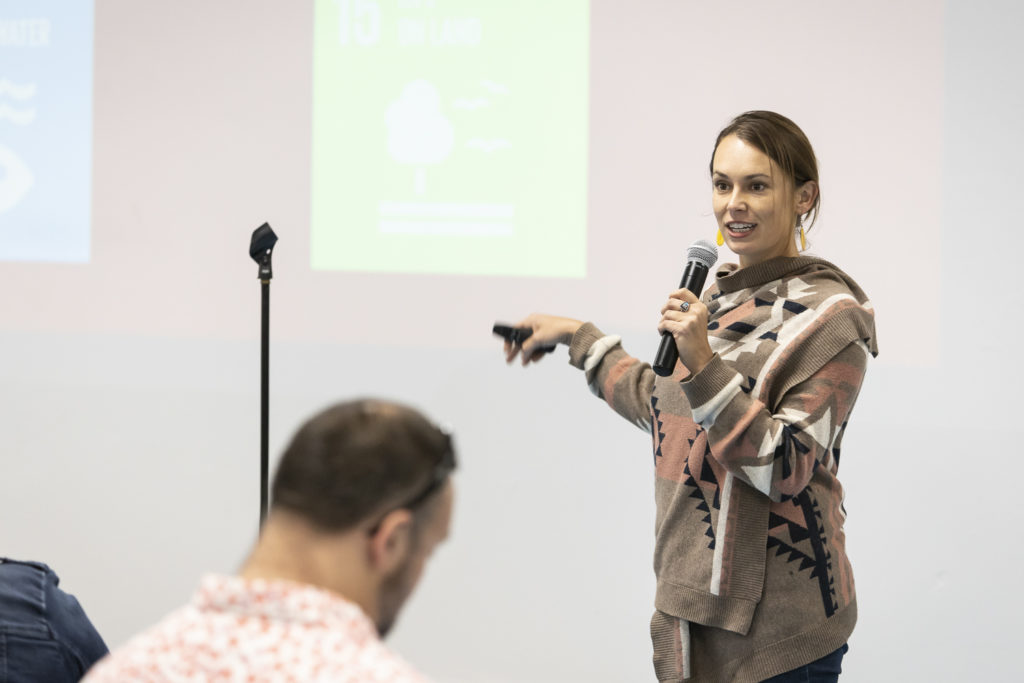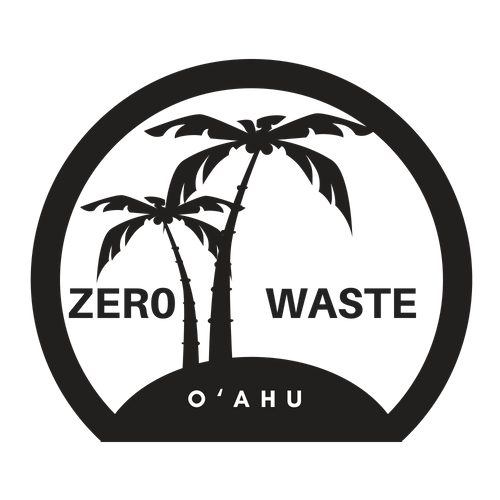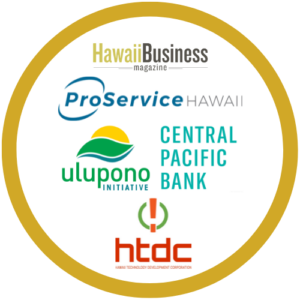Today we’re sharing a Member Spotlight featuring Nicole Chatterson. Nicole works for the University of Hawaii Office of Sustainability and she is a co-founder/director of Zero Waste Oahu. ZWO, as the name implies, is focused on a zero waste future for the island, and she’s working to bring awareness to our various waste streams. ZWO advocates for an integrated approach across the island and a move towards the four R’s: reduce, refuse, reuse, recycle.

Right now, Zero Waste Oahu is organizing community members to get their voices heard about the new Honolulu Waste Management Plan, and is advocating for inclusion of more sustainable solutions, like a policies or programs that reduce the amount of waste created in Honolulu, a large-scale composting network system that would serve residents, and better recycling (by creating less items to recycle!). Sign-up for Zero Waste Oʻahuʻs email to stay in tune and check out web feature here.
Andrea Bertoli (AB): Tell us more about the vision of the Zero Waste Oahu: what are your goals and how are you going to get there?
Nicole Chatterson (NC): Zero Waste Oʻahu envisions an equitable, waste-free future. We are achieving this vision this through policy support, community engagement, and demonstration projects that demystify waste reduction actions.
 Our work starts here on Oʻahu and we plan for our impact to ripple throughout Hawaiʻi. Our goals include developing a Zero Waste Plan for Honolulu, working with the County on waste reduction policy, and reaching out to a wide range of audiences and businesses so we can help people understand how zero waste is relevant and approachable for everyone!
Our work starts here on Oʻahu and we plan for our impact to ripple throughout Hawaiʻi. Our goals include developing a Zero Waste Plan for Honolulu, working with the County on waste reduction policy, and reaching out to a wide range of audiences and businesses so we can help people understand how zero waste is relevant and approachable for everyone!
In the next year, we have a goal to launch a more waste reduction demo projects (like the food waste diversion demo project we are working on with the Impact Hub using Bokashi buckets), and increase our capacity to support the business sector through waste audits that will help them transition to zero waste.
AB: What does a zero-waste future look like?
NC: By definition, zero waste means keeping 90% of the waste stream out of the landfill or incinerator and creating production systems that are not harmful to people or the planet. A zero-waste future would follow the waste hierarchy, meaning we do our very best to reduce waste first. We will realize recycling is a tool to be used in moderation, not an excuse to overconsume. We would stop sending our trash and recycling overseas and into low-income neighborhoods.
We will stop wasting land, water, and energy to produce things that are designed as single-use or designed to become obsolete. We will stop using toxic and fossil fuel-based materials (like plastic) to over-package our food. Our economy would become circular, where any waste that is produced is designed to be a resource. In a circular economy we would compost and turn our food waste into a nutritious resource to grow food, instead of letting it off-gas methane in a landfill or be incinerated at H-POWER.
A zero waste future is a decision to design our society to produce less waste, instead of resigning to engineering our open spaces to become waste repositories.
AB: You were just granted a fellowship through WildGift – tell us more about that organization and how it’s going to help you here.
NC: I am soooo excited about this! Wild Gift is a year long leadership development program for social and environmental entrepreneurs that are in the process of building a social enterprise. Five of us were selected into the cohort and we will kick off our year together with a backpacking trip in the Bould-White Clouds Wilderness in Idaho – the final wilderness area created during the Obama administration.
This 3-week trek is designed to give us the gift of time, of connecting with ourselves, and our cohort away from the grind of daily life. We will then meet virtually over the next year, along with our mentors, and culminate the program in 2020 with a rafting trip.
This program will help me develop Zero Waste Oʻahu through peer-to-peer mentorship with other entrepreneurs that are launching a social venture. I also expect this program will help me become a better leader for Zero Waste Oʻahu by allowing me to unplug – there is nothing like time away from the computer, social media, and other distractions. to recharge and create clarity and direction.
AB: What’s your favorite trashy subject?
NC: Soooo many.
Fruit wrapped in plastic. Why? Why! Why?! The Simply To Go Store at UH Mānoa sells apples and oranges wrapped in plastic. I’ve been told people think itʻs more sanitary, and yet it is well-documented that plastic leaches into/onto our food, so there is really no logic here.
Also, trashy guilt is another topic I could go on about. For me, this the feeling when you end up with plastic regardless of how hard you try to eliminate it from your life. This happens to me at restaurants too often: I forget to say “no straw please” … and then Iʻm stuck with plastic.
AB: If people want to get better about reducing their waste stream, what are three easy steps they can take?
NC:
1. If you like getting coffee or smoothies out, BYO cup! It makes a huge difference, about 30% of our waste stream is made up of single-use packaging and containers! If you do not want to buy a fancy mug, a mason jar (with a cozy to protect your hands from heat) on works perfectly! Currently, none of the single-use cups are recyclable in Honolulu. Some other cities offer compostable cups, which are a better option because they will cause less damage if they get into our natural environment. Even then, the best thing you can do is AVOID any single-use packaging because they all take a lot of resources to make and transport–which seems ridiculous when you realize that you use the cup for a matter of minutes.
2. Sign-up to opt out of junk mail. Most junk mail cannot be recycled because glossy paper and plastics are mixed in the envelopes. You can opt out of junk mail using these directions:
- To opt out for five years: Call toll-free 1-888-5-OPT-OUT (1-888-567-8688) or visit www.optoutprescreen.com. The phone number and website are operated by the major consumer reporting companies. To opt out permanently: You may begin the permanent Opt-Out process online at www.optoutprescreen.com.
3) Buy less packaged food by shopping in bulk bins. Shopping in bulk bins means you get to choose and reuse the packaging. This is made easy by stores like Down to Earth, Kokua Market, and Safeway (the Kapahulu, Piikoi/Beretania, and Mānoa stores) which offer bulk bins for things like snacks, grains, nuts, oats, legumes, and candy. They key is to BYO container. You can tare (which means pre-weigh) plastic or glass containers at the register before shopping, and write the weight with sharpie on a sticker to put on the bin. At the check-out they subtract the weight . The tare process is not necessary if you use the light-weight reusable bags instead.
AB: How can people get involved in the organization?
NC: The best way to get involved right now is by sharing your thoughts with the County of Honolulu on a zero waste future before August 27th: find out the details on our website. Honolulu’s zero waste future needs your voice. You can also stay in touch by signing up for our newsletter on our website and follow us on Instagram, too.

